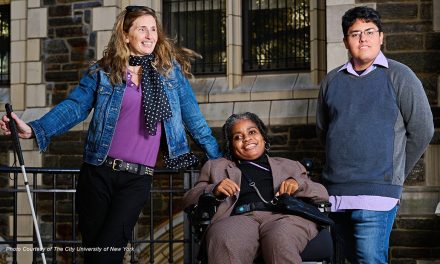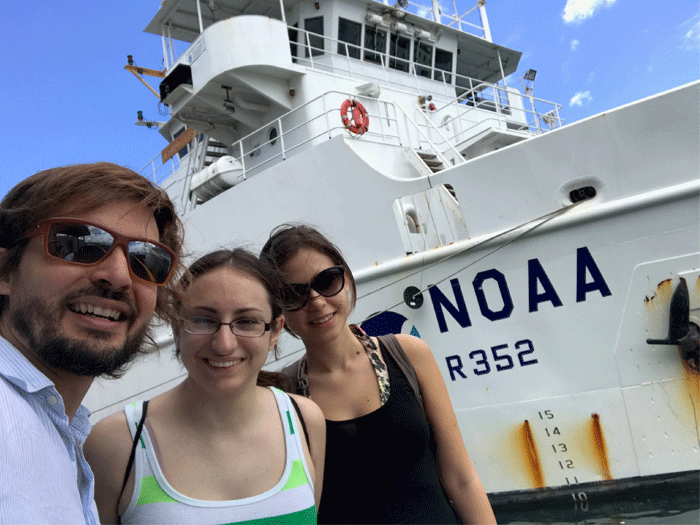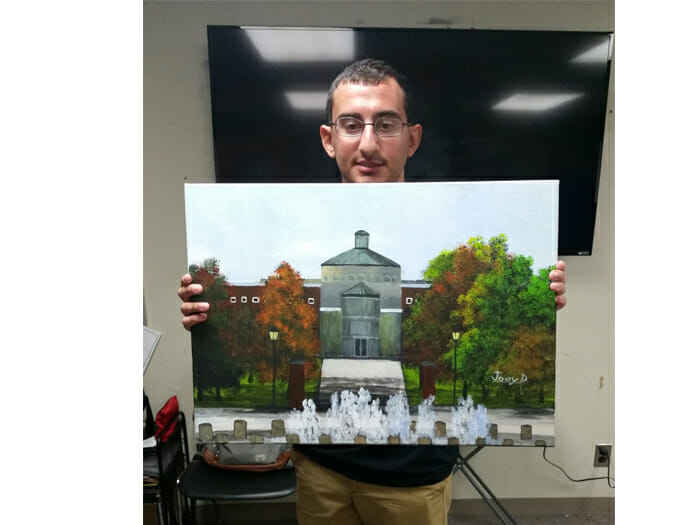Natural HPV/Cervical Cancer Treatment May Hold Key to a Cure
Research alliance between Staten Island University Hospital and CUNY College of Staten Island seeks patent for food-based therapies that target and kill tumor cells

The BLICaR Team: Jimmie Fata, PhD (CSI); Mario Castellanos, MD (SIUH);Pria Ranjan Debata, Ph (CSI); Anita Szerszen, DO (SIUH); Probal Banerjee PhD (CSI).
A revolutionary step toward curing cervical cancer is being forged by medical researchers on Staten Island.
A collaboration between Staten Island University Hospital (SIUH), which is part of the North Shore–LIJ Health System, and a team of scientists at The City University of New York’s College of Staten Island (CSI) has resulted in laboratory evidence of a breakthrough treatment that has the potential to open the door for a new wave of studies.
The partnership, known as Biomedical Laboratories for Integrative Cancer Research (BLICaR), is studying the capability of non-toxic food components to successfully target and kill tumor cells. Under study is curcumin, a spice component of the herb turmeric.
Food as Pharmacy
In the laboratory, strategic chemical linking of curcumin to cancer cell-targeted antibodies has been found to dramatically enhance the spice’s ability to kill melanomas, the most serious form of skin cancer, as well as glioblastoma cells, which form from supportive tissue of the brain and spinal cord.
The BLICaR research team is studying novel approaches to deliver curcumin to cancer cells in the cervix, breast, skin, and brain.
Unlike commonly used toxic chemotherapies, curcumin holds the promise of being relatively safe for normal cells, and therefore may yield a safe treatment strategy without side effects.
“When we began the process about two years ago, we already were aware that curcumin has potent anticancer and antiviral properties,” said Dr.Probal Banerjee, a CSI Professor in the Department of Chemistry and lead scientist in the BLICaR group. “In the past, however, it has been difficult to harness the benefits of curcumin as a treatment because of its tendency to quickly degrade when administered into the body.”
Collaborative Research, Common Cause
The solution to overcoming curcumin’s poor systemic bioavailability for cancer treatments was found during preclinical trials by Dr. Banerjee and the core team of BLICaR researchers: Anita Szerszen, DO, Director of Geriatric Research (SIUH); Mario Castellanos, MD, Clinical Director of Research in the SIUH Department of Medicine; Jimmie Fata, PhD, Assistant Professor in the Department of Biology (CSI), an expert in breast cancer research; and Pria Ranjan Debata, PhD, post-doctoral fellow and lead executor of the experimental aspects of the project.
Killing on Contact in the Lab
The BLICaR project tested the possibility of developing a curcumin-based therapy for cervical cancer, which is caused by certain strains of Human Papillomvirus (HPV). This effort resulted in the development of Vacurin, a curcumin-based vaginal cream, which effectively eradicates HPV (+) cancer cells and does not affect non-cancerous tissue. The team published these results in the journal Gynecologic Oncology in 2012 and applied for a patent for their recent breakthroughs in 2012.
“Our preclinical data supports this novel approach for the treatment of cervical HPV infection,” Dr. Banerjee said. “The next step is to bring what we have accomplished in the lab to the patient.”
The BLICaR team hopes to accomplish this within a year, said Dr. Castellanos of SIUH. He presented their innovative treatment at the prestigious 28th International Papillomavirus Conference and Scientific Meeting in November 2012 in San Juan,Puerto Rico.
From Lab to Patient
Curcumin-based vaginal cream may not be successful in treating HPV-induced cervical cancers, which have already spread to the uterus and ovaries. However, the team’s preclinical research has also led to a natural formulation that can be injected and may offer greater efficacy for more advanced tumors. According to Banerjee, the team’s laboratory experiments have shown a dramatic response in advanced-stage cancers. Currently, the team is examining such innovative methods and novel formulations to effectively treat patients with HPV infections and all stages of cervical cancer.
Dr. Castellanos is in the forefront of this promising therapy in the clinical setting at SIUH. “So that we can begin a phase-one clinical trial, we need approval from the FDA,” Dr. Castellanos said. “The largest hurdle we are facing right now is the funding that is needed to get there.”
“The College of Staten Island is committed to community-based collaborative research projects that bring leading experts in their fields together to solve some of today’s most challenging issues with innovative approaches to finding solutions,” commented Dr. William J. Fritz, Interim President of CSI. “Together with SIUH, we are proud to be at the forefront of this promising curative and preventative approach.”
“Staten Island University Hospital has a long and proud history of innovation in healthcare, and now, as part of the North Shore–LIJ Health System with its pre-eminent Feinstein Cancer Institute and our partnership with CSI researchers, we have the potential to achieve even more,” said Anthony C. Ferreri, SIUH President and CEO.
Local Research, Global Impact
Despite advances and preventative measures, such as PAP tests and vaccines, many women are continuing to develop cervical cancer worldwide.
—About 12, 000 women in the United States develop cervical cancer each year according to the Centers for Disease Control and Prevention.
—In the U.S., most women are routinely examined for signs of HPV and, if needed, are treated prior to the development of cancer.
—In other countries, PAP smears are not common. This leads to a higher incidence of cervical cancer.
—Every year, more than 270,000 women die from cervical cancer, with more than 85 percent of these deaths in low and middle income countries, according to the World Health Organization.
“In the U.S., most women are routinely examined for signs of HPV and, if needed, are treated prior to the development of a cancer,” Dr. Fata said. “In some countries, PAP tests are not as common, leading to a higher incidence of cervical cancers.”
As research continues on Staten Island, the BLICaR group focuses on the capability of natural food components to target and kill tumor cells without the damage to surrounding tissue associated with today’s treatments. It is hoped that women in the U.S. and globally will soon see the day when HPV and cervical cancers are much less a threat.


















